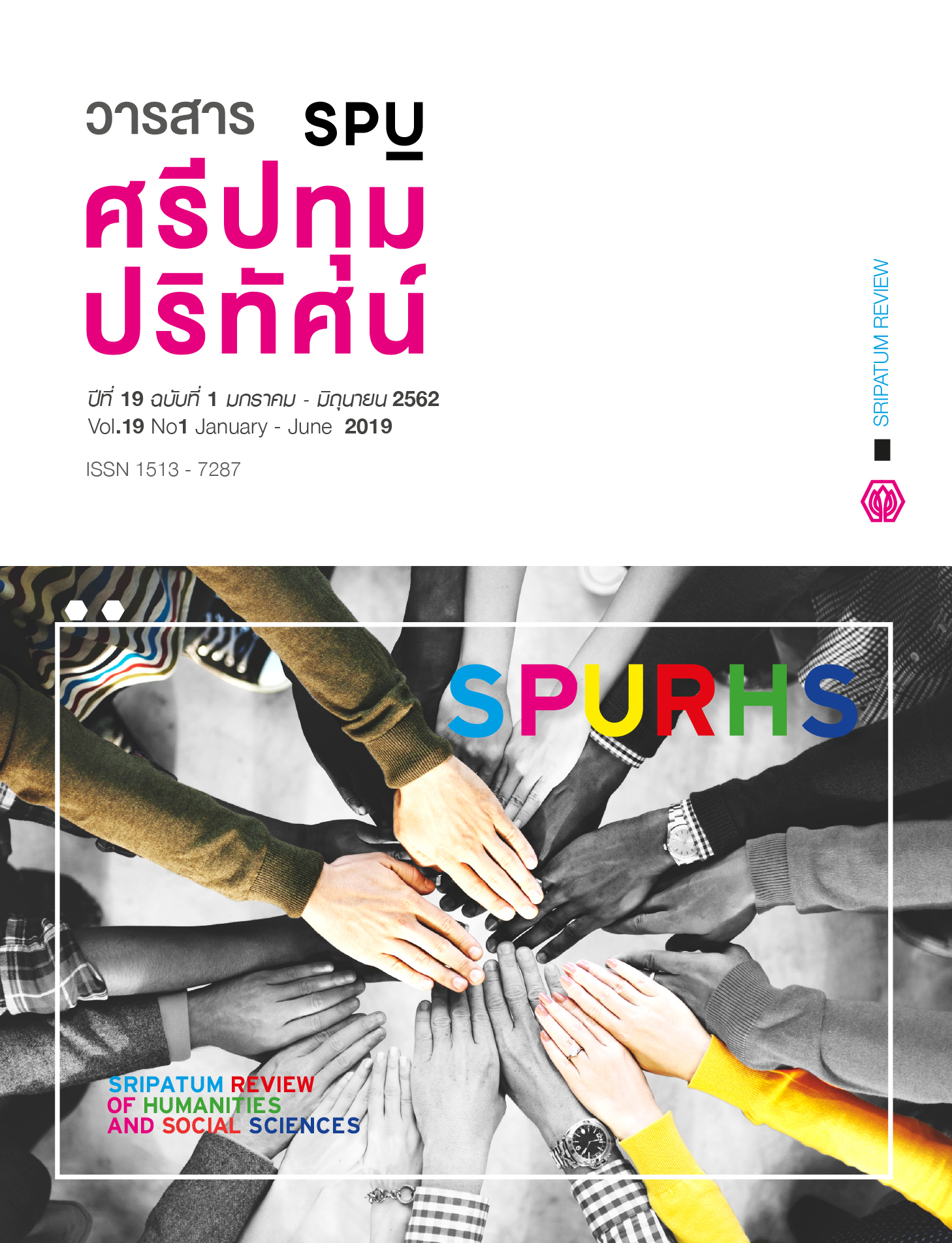แนวทางการส่งเสริมกระบวนการมีส่วนร่วมของชุมชนในการวางแผนพัฒนาพื้นที่ ในเขตพัฒนาเศรษฐกิจพิเศษตราด (Guidelines for Promoting Community Participatory Process in Area Development Planning in Trat Special Economic Development Zone)
Main Article Content
Abstract
The objectives of this qualitative research were to (1) analyze community context and situation related to area development in Trat Special Economic Development Zone, (2) analyze community participatory process in area development planning in Trat Special Economic Development Zone, and (3) propose the guidelines for promoting community participatory process in area development planning in Trat Special Economic Development Zone. The key informants were representatives from local public, private, academic, and civil society sectors. Data were collected using documentary research, in-depth interviewing, focus group discussion, and observation, which were analyzed using comparative data from community participation, and interpretation to create inductive conclusions.
The research findings were (1) people of Trat used the words “Trat the Green City” before Trat province was declared as a special economic zone, which was an important mediator that made Trat’s people coexist with Trat Special Economic Development Zone; (2) representatives from civil society sector were the agents who reflected the general-dispositions (habitus) or identity of Trat’s people through historical and socio-structural forces; therefore, the public sector should support the identity-led area development; and (3) in the community participatory process, not only representatives from the state, private, academic, and civil society sectors must participate in the planning process, but also every sector must be promoted to understand the identity of Trat’ people.
Article Details
1. กองบรรณาธิการสงวนสิทธิ์ในการพิจารณาและตัดสินการตีพิมพ์บทความในวารสาร
2. บทความทุกเรื่องจะได้รับการตรวจสอบทางวิชาการโดยผู้ทรงคุณวุฒิ แต่ข้อความและเนื้อหาในบทความที่ตีพิมพ์เป็นความรับผิดชอบของผู้เขียนแต่เพียงผู้เดียว มิใช่ความคิดเห็นและความรับผิดชอบของมหาวิทยาลัยศรีปทุม
3. การคัดลอกอ้างอิงต้องดำเนินการตามการปฏิบัติในหมู่นักวิชาการโดยทั่วไป และสอดคล้องกับกฎหมายที่เกี่ยวข้อง
References
Boonlom, P. (2017). A Survey of the Attitudes of Local Residents toward Phase 1 of the Proposed Special Economic Zone Development Plan for Klong Yai District, Trat Province. Independent Study of the Degree of Master of Public Administration Program in Local Government. Chanthaburi: Rambhai Barni Rajabhat University. (in Thai)
Chantavanich, S. (2014). Qualitative Research Methods. 22nd ed. Bangkok: Chulalongkorn University Press. (in Thai)
Giddens, A. (1984). The Constitution of Society: Outline of the Theory of Structuration. California: University of California Press.
Kasampolkoon, A. (2005). History of the Travel of King Chulalongkorn to Koh Chang in Trat Province. Bangkok: Trat Provincial Cultural Office, Ministry of Culture, and Designated Areas for Sustainable Tourism Administration. (in Thai)
Ng, M.K. (2011). Strategic Planning of China’s First Special Economic Zone: Shenzhen City Master Plan (2010-2020). Planning Theory & Practice, 12 (4), 638-642.
Office of the National Reform Council. (2015). Guidelines for the Economic Development in Border Area. Bangkok: Office of the National Reform Council. (in Thai)
Office of the Political Development Council. (2016). Civic Participation in Special Economic Development Zones. Bangkok: Office of the Political Development Council. (in Thai)
Pearce, F. (2012). The Land Grabbers: The New Fight over Who Owns the Earth. Boston, MA: Beacon Press.
Santasombat, Y. (2016). The Border. Bangkok: Thailand Research Fund. (in Thai)
Siriprakob, P. (2010). Autonomous Public Organization and Its Autonomy: A Preliminary Finding. Sripatum Review: Humanities and Social Science, 10 (2), 63-77. (in Thai)
Stones, R. (2005). Structuration Theory. New York: Palgrave Macmillan.
Sugunnasil, W. (2017). Special Economic Development Zone in Thailand: Current Situation, Possibilities, and Constraints. Journal of Sociology and Anthropology, 36(1), 27-55. (in Thai)
Warabamrungkul, T. and Suvarnakuta, K. (2018). Management Potential of Trat’s Special Border Economic Zone. Journal of Humanities and Social Sciences Mahasarakham University, 37(4), 63-77. (in Thai)
White, J. (2011). Fostering Innovation in Developing Economies through SEZs. In Special Economic Zones: Progress, Emerging Challenges, and Future Directions, 183-205. Washington DC: World Bank.


